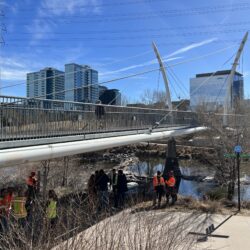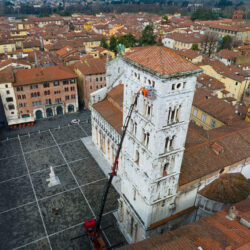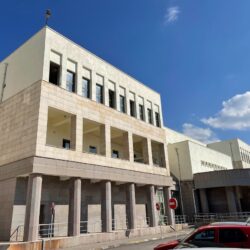Start
01/07/22
Move Solutions Devices
PROJECT OVERVIEW
This case study is a pioneering project led by Professor Hannes Grabe, Head of the Department and Chair of Railway Engineering at the University of Pretoria. The article showcases the application of Move Solutions’ advanced technology for the real-time and long-term monitoring of a railway viaduct in Pretoria, South Africa.
THE NEED FOR ADVANCED MONITORING IN SOUTH AFRICA
The railway sector in South Africa is on the cusp of a transformative era, with Transnet objectives and government investments bolstering its development. The University of Pretoria, in collaboration with key industry stakeholders, is pioneering Railway Engineering advancements in Africa. Embracing the Fourth Industrial Revolution (4IR) technologies, the University is developing its Engineering 4.0 campus, focusing on Transportation and Railway Engineering.
MONITORING OBJECTIVES
The main goal was to monitor deflection and acceleration responses on the viaduct for effective maintenance planning and performance management. By choosing the track transition from an embankment to a viaduct and a nearby control site, the project aimed to establish a comparative analysis of train dynamics and track response at these adjacent locations.
SOLUTION IMPLEMENTATION
To comprehensively monitor the bridge’s movement, Move Solutions installed:
- Dynamic Displacement Sensors, for vertical sleeper deflection and vertical deflection of the viaduct;
- Accelerometers, measuring the sleeper acceleration.
These sensors, leveraging LoRaWAN communication, transmit data to Move Solutions IoT Platform, ensuring continuous and reliable monitoring. The system employs advanced diagnostic tools like Frequency Domain Decomposition, Displacement Density Probability function, and Fast Fourier Transform. Alarm triggers are set for deflection exceedances (sleeper/bridge/rail deflection), temperature exceedances (indicative of rail kickouts or breaks), acceleration exceedances (from rolling stock), door status, and security breaches.
PROJECT OUTCOMES
Since the baseline date in July 2022, the system has been functioning exceptionally, providing over a year’s worth of valuable data. Key findings include:
- a clear correlation between temperature and deflection on an event scale;
- a long-term downward trend in vertical deflections and accelerations;
- real-time monitoring with reliable LoRaWAN communication and specialized trending has proven crucial in maintenance planning and infrastructure health assessment.
This project demonstrates the efficacy and the need of advanced monitoring technologies in the rail industry, paving the way for smarter, safer, and more efficient railway systems.








